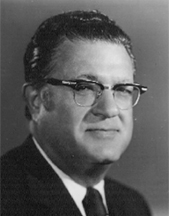1909 – 1975
Established strong foundation for mental health and community organization practice as well as gerontology education
Al Feldman was originally trained as a research chemist but soon realized that human beings interested him more than test tubes. In 1933, he worked as a caseworker for the newly created California State Relief Administration. He never left the field of social work, and carried into it the hard-science research methodology in which he had been trained.
After progressing rapidly from caseworker to supervisor, and then to positions in research and administration in the CSRA, he joined the staff of the Los Angeles Welfare Planning Council, a private agency. Except for World War II military service and a two-and-a-half year leave to study for his doctorate, he remained there until 1960.
Following a two-year stint at the USC School of Public Administration to conduct a Ford-financed research demonstration in community organization on juvenile delinquency control in Santa Monica, California he returned to the Welfare Planning Council as creator and director of its Mental Health Development Commission. While directing this project, he also taught community organization at the UCLA School of Social Welfare. It was in the field of community organization, and in mental health particularly, research, practice, and legislation, that he made his greatest contributions as a social worker, not only locally but also statewide and nationally.
In 1968 as Deputy Director of USC’s Andrus Gerontology Center, Feldman took charge of designing and staffing the Center’s first training program in mental health, developing a variety of programs for social workers, nurses, and other health care professionals in gerontology; simultaneously he taught community organization and research in the USC School of Social Work. At the Andrus Center he also designed the Davis School of Gerontology, playing a pivotal role in its established in 1974, the year before his death at the age of sixty-six.
The special marks of Al Feldman’s full and varied career in social work were his rare ability to carry out innovative, often groundbreaking research combined with his unusual gifts of personal warmth, caring, and the persuasiveness needed to enlist others to apply his research findings to bring about practical change. He undertook many exceptional and in some cases professionally and politically risky-research demonstration projects. These not only enhanced the theoretical underpinnings of social work, especially in the realm of social work administration and community organization, but led to widespread applications in social work practice both locally and nationally.
Al Feldman’s daughter, as a teenager, remembers sitting at the kitchen table listening to her father’s happy account of some minor triumph in his day…”one small step along the way to another small step toward giving people slightly better lives than they had before Al Feldman’s latest bright idea about how to help humanity.”
